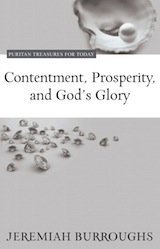The apostle Paul once wrote:
I have learned to be content whatever the circumstances. I know what it is to be in need, and I know what it is to have plenty. I have learned the secret of being content in any and every situation, whether well fed or hungry, whether living in plenty or in want. (Philippians 4: 11-12)
Reading this passage, I have always focused on Paul’s contentment with very little. Contentment, Prosperity, and God’s Glory, however, focuses on the other part of Paul’s statement: learning to be content and live well with plenty. According to Jeremiah Burroughs, an early 17th century Puritan preacher, learning to live a godly life in the midst of abundance is very difficult.
Even the poor among us live in plenty compared to most people across the world and throughout history. We may have less than we did a few years ago, but we’re still wealthy in a relative sense. In a similar economic situation almost 400 years ago, Burroughs said much the same: “However, the truth is that we live here in such a way that, although we may not be as full now as we have been in the past, it may still be said of us that we are full in comparison to our brothers in other parts of the world.”
And living in plenty is a very difficult thing to do well. We tend to focus on ourselves, meet our own wants, forget to love God, and trust in God’s gifts rather than in God himself. Rather than be grateful to God for blessing us with more material goods than others, we tend to focus on negative things in our lives and live for our own pleasures…just like the wealthy and titled people Burroughs was preaching to.
Contentment, Prosperity, and God’s Glory describes the difficulty, the necessity, the excellency, and the mystery of learning to live with abundance. With detailed lists, carefully explained, Burroughs attempts to teach this vital life-skill. Contemporaries testified that Burroughs lived what he taught, even though he claims it takes years to learn. The author also discusses sins often associated with having more than enough and gives suggestions on how we can benefit spiritually from abundance rather than fall away from God because of it.
An abundance of material goods, happy family members, good health, a safe community, the freedom to homeschool…these are some of the gifts God has given many of us. We must be careful to enjoy such gifts gratefully and use them wisely to God’s glory.
When I read this book, I thought of the abundant health I now enjoy compared to the past, and the many years I now look forward to compared to the half year I was once given. One would expect that I would never grumble about health or time after such wake-up calls. However, I still often struggle with the fact that my health is not perfect, and sometimes I wish for more time. I am not grateful enough. I am not even a careful enough steward of the time and health I have been given. This book has inspired me to rethink the way I live.
There is much to learn from Contentment, Prosperity, and God’s Glory. Although the book’s style is somewhat ponderous, it can inspire every Christian to live well. As well, we homeschooling moms can learn so much to pass on to our children.
Note: There are some statements in this book that I question. For example, is ‘the great work for which you live’ ‘the advancement of the gospel and your own spiritual good’, or should ‘glorifying God’ replace the focus on our own spiritual good?
To read more reviews of Contentment, Prosperity, and God’s Glory, visit Cross Focused Reviews.
This is yet another book in the in the 2013 52 Books in 52 Weeks Challenge and is also linked to Saturday Reviews and Encourage One Another Wednesday.
Disclosure: For the purposes of this review, I received a free ebook from Reformation Heritage Books via Cross Focused Reviews. I have expressed my own opinion.


Annie,
Thanks for contributing to the blog tour.
Shaun Tabatt
Cross Focused Reviews